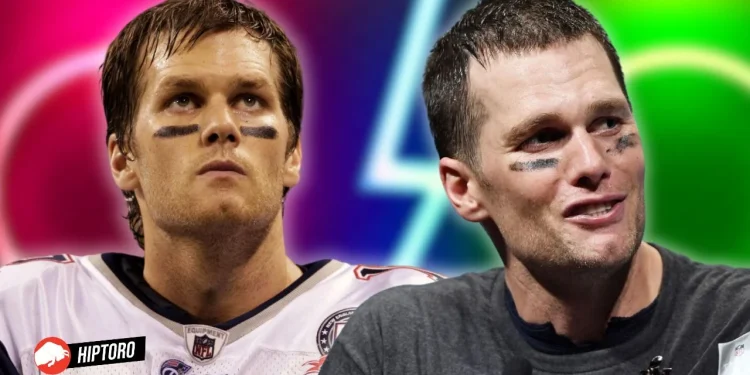When talking about the top 10 NFL comeback victories of all time, we are diving into a reservoir of thrilling moments, emotional peaks, and unforgettable performances. These comebacks capture the essence of why football holds such a special place in the hearts of fans across America and beyond. Not only do these games showcase the unpredictable nature of the sport, but they also exemplify the perseverance and resilience of athletes pushing the boundaries of possibility.
Each of these comebacks tells a unique story of determination and tactical brilliance, often underpinned by a blend of individual heroics and collective effort. As we explore these iconic games, it’s essential to appreciate the context in which these comebacks occurred—the playoff implications, the rivalries, and the pressure of the moment—which elevates their significance and embeds them deeply in the annals of NFL history.
Here are the Top 10 NFL Comeback Victories of All Time
1. 1993 Buffalo Bills vs. Houston Oilers: The Comeback
On January 3, 1993, during the Wild Card Playoff game at Rich Stadium, the Buffalo Bills orchestrated the most significant comeback in NFL history. Their opponent, the Houston Oilers, had dominated the first half, leaving the Bills trailing by a seemingly insurmountable 32 points. The game appeared all but over when the scoreboard read 35-3 early in the third quarter. However, what unfolded next would forever be etched in the annals of sports history as “The Comeback.”

The Bills were without their starting quarterback, Jim Kelly, injured in the final game of the regular season, and the reins were handed to backup Frank Reich. The situation seemed dire after Houston’s Bubba McDowell returned an interception for a touchdown, extending their lead. Nonetheless, Reich and the Bills remained undeterred. Buffalo began to claw back into the game, capitalizing on a series of Oilers’ mistakes. Reich threw a touchdown pass to Don Beebe, but it was just the beginning.
The momentum shifted dramatically after the Bills recovered an onside kick. Reich connected with Andre Reed for three of his four touchdown passes in the second half, each score whittling down the Oilers’ lead. The energy of Rich Stadium transformed with each play, as hope surged through the stands and onto the field. The Bills tied the game at 38-all with a field goal, forcing an overtime that seemed unimaginable just an hour earlier.
In overtime, the Bills completed their historic rally. Steve Christie, amidst the deafening cheer of the home crowd, kicked a 32-yard field goal to win the game 41-38. This victory was not merely about the points scored but represented a monumental display of resilience and determination. The game holds the record for the largest comeback in NFL history and remains a testament to never giving up, no matter the odds.
2. 2014 NFC Championship: Seattle Seahawks vs. Green Bay Packers
The 2014 NFC Championship game, held on January 18, 2015, between the Seattle Seahawks and the Green Bay Packers, is a standout example of why football is a game of four quarters. The Seahawks, playing at home at CenturyLink Field, found themselves trailing the Packers 19-7 with just over five minutes left on the clock. The Packers, with their stalwart defense and efficient offense, had controlled much of the game, but the Seahawks were about to remind everyone why they were the defending Super Bowl champions.

Seattle’s comeback began with a series of high-risk plays that would either spell their doom or pave their path to victory. Russell Wilson, who had struggled throughout the game, throwing four interceptions, led a crucial drive that ended with a touchdown by Marshawn Lynch. The Seahawks then executed a successful onside kick, which bounced off the Packers’ Brandon Bostick and was recovered by Seattle. The stadium erupted as the Seahawks seized the moment to rewrite the narrative of the game.
Capitalizing on the Packers’ stunned state, Wilson led another scoring drive, culminating in a touchdown pass to Luke Willson and a daring two-point conversion thrown across the field to tight end Cooper Helfet. The game was tied at 22 after Mason Crosby kicked a field goal for Green Bay, sending the match into overtime.
In overtime, the Seahawks won the coin toss and chose to receive. Wilson, demonstrating short memory and resilience, connected with Jermaine Kearse for a 35-yard touchdown pass on the first drive, clinching a breathtaking 28-22 victory. This game is remembered not just for its dramatic finish but for embodying the Seahawks’ spirit of perseverance and belief, qualities that turned what seemed like an assured defeat into a glorious victory.
3. 1981 NFC Championship: San Francisco 49ers vs. Dallas Cowboys: The Catch
January 10, 1982, marked a pivotal moment in NFL history. The game between the San Francisco 49ers and the Dallas Cowboys in the NFC Championship at Candlestick Park would come to be defined by a single, spectacular play known universally as “The Catch.” Before this iconic moment, however, was a tense and tightly contested matchup that showcased the rising prowess of a 49ers team led by coach Bill Walsh and quarterback Joe Montana.
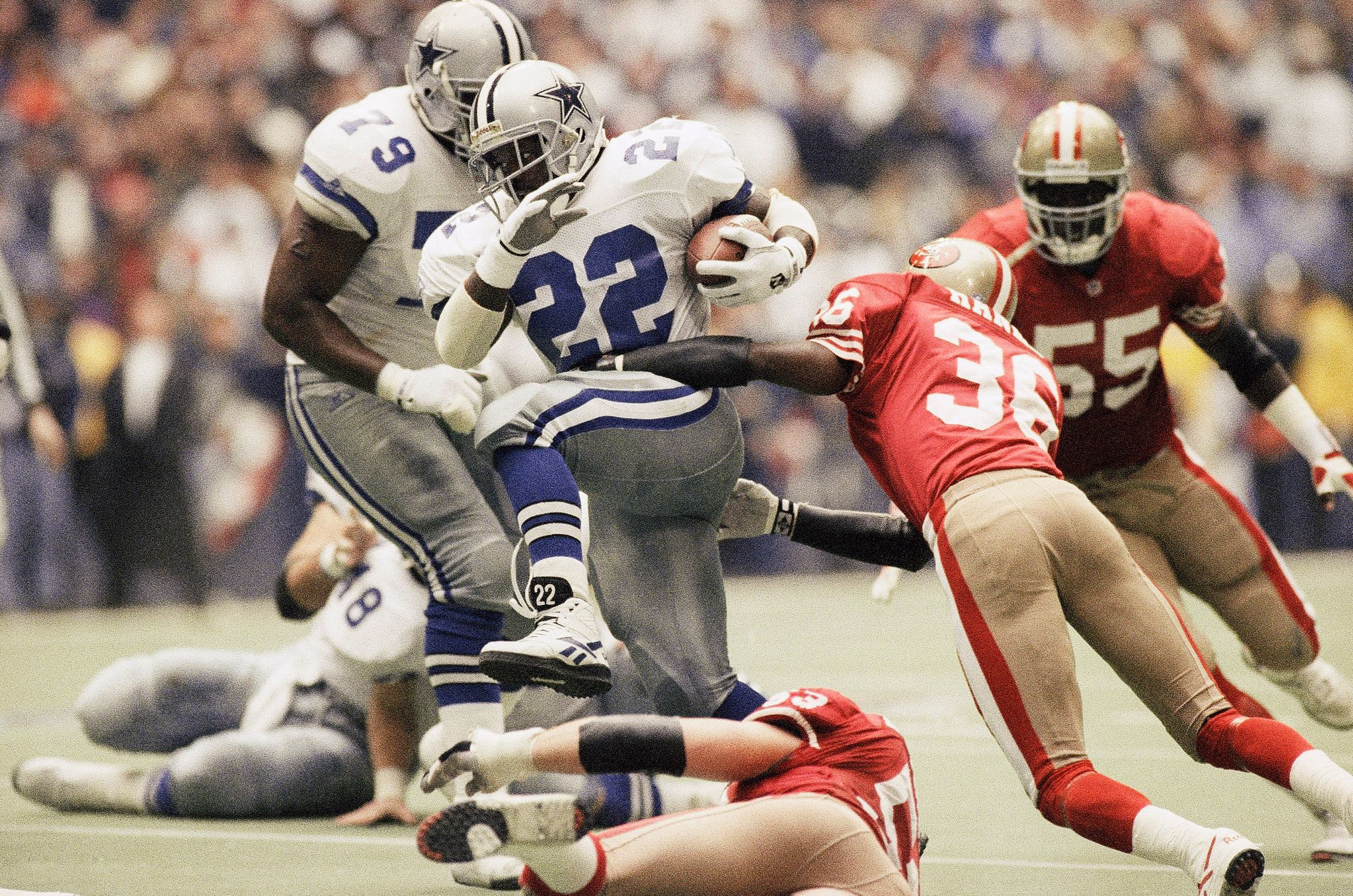
The Cowboys had been a dominant force in the NFC throughout the late 1970s and early 1980s, and they looked poised to return to the Super Bowl after taking a 27-21 lead late into the game. However, Joe Montana and the 49ers mounted a resilient drive in the final minutes of the fourth quarter, methodically moving down the field against a stout Dallas defense. With less than a minute left on the clock, Montana faced a third-and-three from the six-yard line.
As Montana rolled to his right, pressured by the Cowboys’ defensive end Ed “Too Tall” Jones, it appeared he might run out of room to make a play. At the very edge of his escape, Montana launched an improbable high pass towards the back of the end zone.
Dwight Clark, the 6-foot-4 receiver, leaped and miraculously caught the ball with his fingertips, securing a 28-27 victory for the 49ers. This win not only sent San Francisco to their first Super Bowl but also signaled the beginning of a dynasty. “The Catch” remains one of the most celebrated plays in NFL and 49ers history, symbolizing the dramatic shift of power in the NFC.
4. Super Bowl LI: New England Patriots vs. Atlanta Falcons
Super Bowl LI on February 5, 2017, between the New England Patriots and the Atlanta Falcons, featured the most extraordinary comeback in Super Bowl history. The game, held at NRG Stadium in Houston, Texas, saw the Falcons racing to a 28-3 lead midway through the third quarter.
The Patriots, led by coach Bill Belichick and quarterback Tom Brady, faced seemingly insurmountable odds. Yet, what followed was a display of tactical brilliance and unwavering determination that has defined the Patriots’ dynasty.
Tom Brady, orchestrating one of the greatest performances in his illustrious career, led the Patriots on a series of scoring drives. The comeback began with a James White touchdown late in the third quarter. Entering the fourth quarter, New England’s defense tightened, stifling the Falcons’ previously explosive offense. Brady continued to exploit Atlanta’s defense, finding Danny Amendola for a crucial touchdown followed by a successful two-point conversion to bring the score to 28-20.
The Patriots’ relentless pressure resulted in key mistakes from the Falcons, including a crucial sack on Matt Ryan and a penalty that took them out of field goal range. With just under three minutes left, Brady again marched the Patriots down the field, culminating in another touchdown and two-point conversion to tie the game at 28-28, completing the largest comeback in Super Bowl history and sending the game into overtime.
In overtime, the Patriots won the coin toss and elected to receive. Brady, displaying his typical poise, led a methodical drive down the field, capped off by James White’s 2-yard touchdown run. This 34-28 victory not only secured the Patriots’ fifth Super Bowl title but also solidified Tom Brady’s legacy as one of the greatest quarterbacks in NFL history. The game is a testament to the Patriots’ culture of resilience and has been etched in sports lore as the “28-3 comeback.”
5. 2006 AFC Championship Game: Indianapolis Colts vs. New England Patriots
The 2006 AFC Championship game on January 21, 2007, between the Indianapolis Colts and the New England Patriots, was a classic battle that highlighted the intense rivalry between the two teams during the 2000s. The game, held at the RCA Dome in Indianapolis, featured a dramatic role reversal, with the Colts overcoming a 21-3 deficit to claim their first Super Bowl berth in the Peyton Manning era.

Early in the game, the Patriots dominated both offensively and defensively, intercepting Manning twice and building a substantial lead. However, Manning, known for his analytical approach and precision passing, remained unfazed. He led the Colts on a critical drive late in the second quarter, culminating in a touchdown that began to shift momentum.
As the game progressed, Indianapolis’ defense stepped up, halting the Patriots’ offense and giving Manning more opportunities to chip away at the lead. Manning found Dallas Clark, Joseph Addai, and Reggie Wayne for key receptions, methodically moving the chains and controlling the clock. The Colts’ resilience was on full display as they took their first lead of the game with only one minute remaining, thanks to a rushing touchdown by rookie Joseph Addai.
The game’s climax came when the Colts’ defense, much maligned for its postseason performances, made a critical stop on fourth down, sealing a 38-34 victory. This game was not just a testament to Manning’s greatness but also a defining moment for the Colts’ franchise. Overcoming their playoff nemesis in such dramatic fashion allowed them to advance to Super Bowl XLI, where they would eventually claim their first championship under Manning. The 2006 AFC Championship remains one of the most memorable playoff games in NFL history, symbolizing the peak of one of the league’s most storied rivalries.
6. 1972 AFC Divisional Playoff: Pittsburgh Steelers vs. Oakland Raiders: The Immaculate Reception
The 1972 AFC Divisional Playoff game between the Pittsburgh Steelers and the Oakland Raiders, held on December 23, 1972, at Three Rivers Stadium, featured one of the most famous plays in NFL history. The Steelers, who had been perennial losers for much of their history, were facing a formidable Raiders team. Pittsburgh was trailing 7-6 with just 22 seconds remaining in the game, and it seemed like their season was about to end. However, what happened next would be forever remembered as the “Immaculate Reception.”
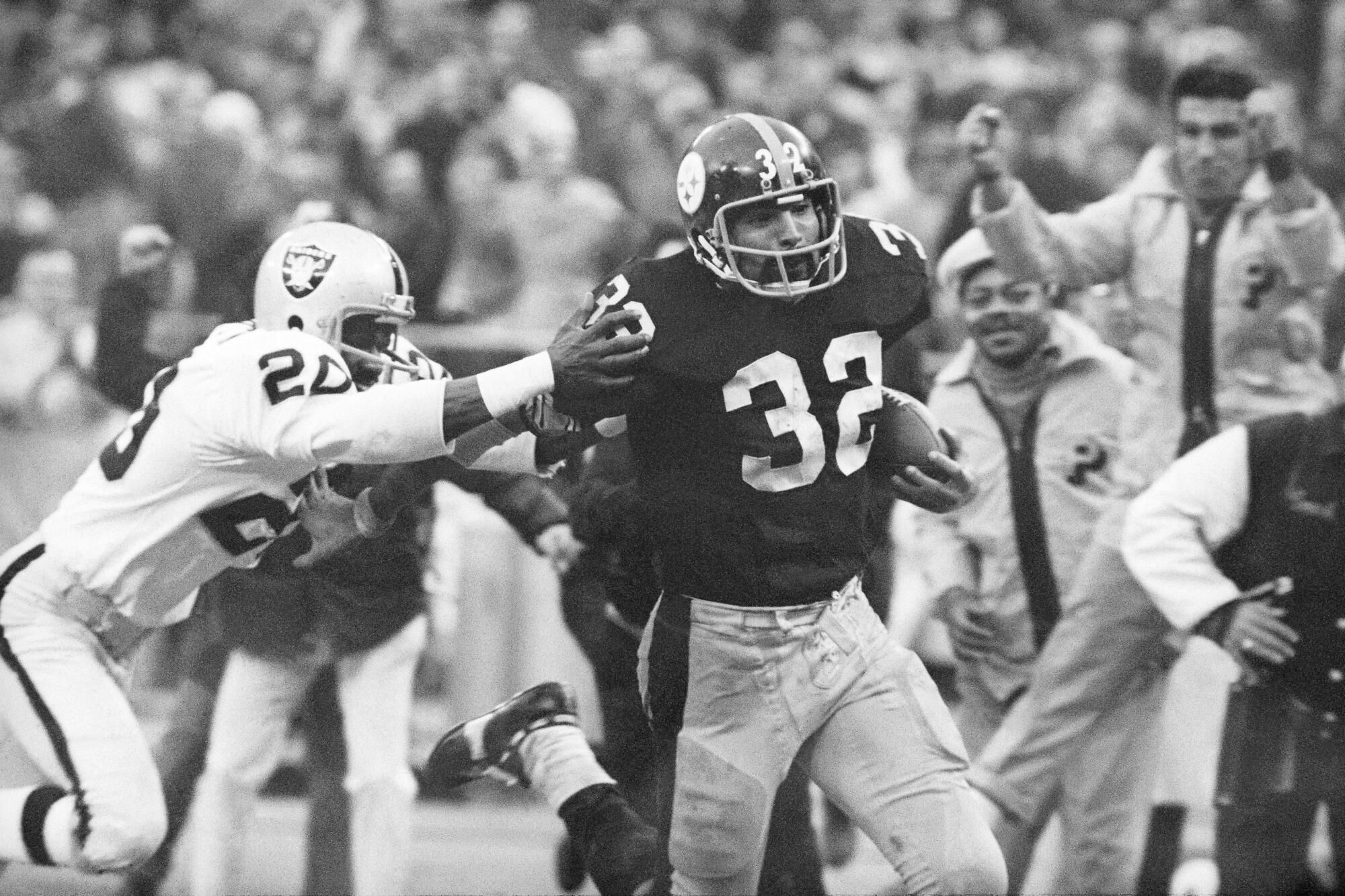
Facing a fourth-and-10 from their 40-yard line, Steelers quarterback Terry Bradshaw launched a desperate pass downfield toward running back John “Frenchy” Fuqua. The ball collided with Raiders’ safety Jack Tatum or possibly Fuqua himself — the exact details remain a subject of heated debate — and ricocheted back towards the line of scrimmage. Just as the ball was about to hit the ground, Franco Harris, the Steelers’ rookie running back, scooped it up without breaking stride and ran it in for a touchdown. The play gave the Steelers a dramatic 13-7 victory and marked the beginning of a dynasty.
This game not only propelled the Steelers into the AFC Championship but also marked their emergence as a powerhouse in the NFL, leading to four Super Bowl titles in the next six years. The Immaculate Reception is celebrated not just for its sheer improbability but also for its impact on the Steelers’ franchise, turning a history of losing into one of the most successful in sports history.
7. 1981 NFC Championship: San Francisco 49ers vs. Dallas Cowboys
The 1981 NFC Championship game, held on January 10, 1982, at Candlestick Park, is famously known for “The Catch,” but the entire game is a tale of resilience and dramatic shifts that led to one of the most storied moments in NFL history. The San Francisco 49ers, led by the young and promising Joe Montana, were up against the seasoned Dallas Cowboys, a team familiar with the pressures of big games and the taste of success.
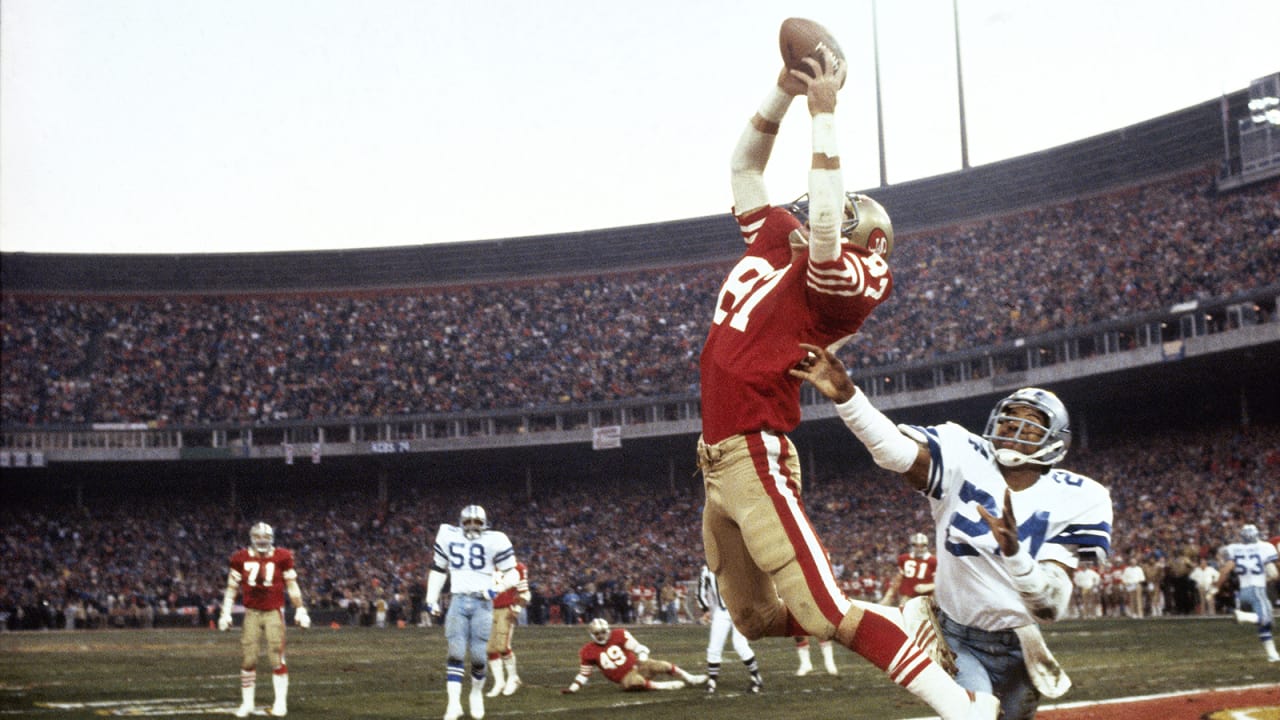
Early in the game, the Cowboys showcased their experience, executing plays with precision and building a lead. The 49ers, however, displayed their burgeoning team spirit and tactical ingenuity under coach Bill Walsh. Despite several turnovers and missed opportunities, San Francisco stayed within striking distance, a testament to their defense and the calm leadership of Montana.
As the game progressed, the 49ers found themselves trailing 27-21 with less than five minutes on the clock. Montana orchestrated an 89-yard drive, marked by crucial completions and tense moments, showing poise and determination against a relentless Cowboys defense. The drive culminated in one of the most iconic plays in NFL history: on a third down, with the end zone in sight, Montana appeared to be running out of options and time. In a moment of sheer improvisation, he lofted the ball towards Dwight Clark, who made a leaping grab in the end zone, securing a 28-27 victory for the 49ers.
This game not only propelled the 49ers to their first Super Bowl but also marked the beginning of a dynasty that would dominate the NFL in the years to come. It was a symbolic passing of the torch in the NFC, as the 49ers’ victory represented a shift in power, from the established Cowboys to a new powerhouse in San Francisco.
8. 2000 AFC Wild Card: Miami Dolphins vs. Indianapolis Colts
The 2000 AFC Wild Card matchup between the Miami Dolphins and the Indianapolis Colts was a testament to the unpredictability of playoff football and the dramatic swings that can define a game. The Colts, led by a young Peyton Manning, started strong, quickly building a 14-0 lead and appearing to control the game’s tempo. However, the Dolphins, showcasing their resilience, began to claw their way back into contention.

The Dolphins’ comeback was fueled by an outstanding performance from running back Lamar Smith, who would end up carrying the ball 40 times for 209 yards and two touchdowns. His relentless effort on the ground chipped away at the Colts’ defense, wearing them down and allowing Miami to regain balance on offense. The game was tied at 17-17 at the end of regulation, pushing it into overtime.
In overtime, Lamar Smith continued to dominate, culminating in a 17-yard touchdown run that sealed a 23-17 victory for the Dolphins. This game is remembered not only for Smith’s heroics but also for the Dolphins’ collective spirit and tenacity, overcoming a poor start to snatch victory from the jaws of defeat.
9. 2013 NFC Championship: Seattle Seahawks vs. San Francisco 49ers
The 2013 NFC Championship game between the Seattle Seahawks and the San Francisco 49ers was a fierce battle, reflective of the intense rivalry that had developed between these two powerhouses of the NFC. Held on January 19, 2014, at CenturyLink Field, the game was a defensive masterclass, with both teams displaying physicality and strategic depth.
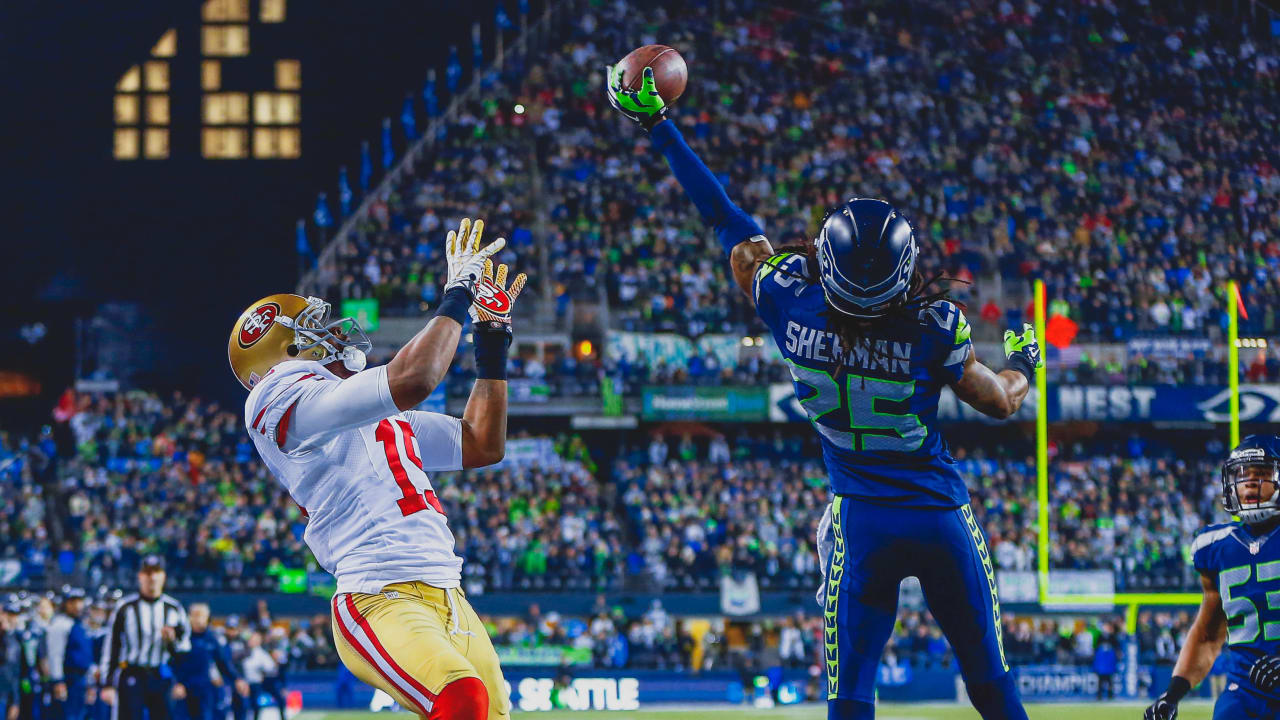
The Seahawks, led by quarterback Russell Wilson and the formidable ‘Legion of Boom’ defense, found themselves trailing in the fourth quarter. However, Seattle’s defense tightened, making crucial stops and setting the stage for the offense to make a comeback. Wilson, showing maturity beyond his years, led a pivotal drive that resulted in a touchdown pass to Jermaine Kearse, giving the Seahawks a late lead.
The defining moment of the game came when Richard Sherman, one of the vocal leaders of the Seahawks’ defense, made a dramatic play in the end zone. He tipped a pass intended for Michael Crabtree into the hands of teammate Malcolm Smith for an interception, effectively sealing a 23-17 victory. This game not only sent Seattle to the Super Bowl but also highlighted their defensive prowess and clutch performance under pressure.
10. 1992 AFC Wild Card: Buffalo Bills vs. Houston Oilers
The 1992 AFC Wild Card game between the Buffalo Bills and the Houston Oilers remains one of the most remarkable comeback stories in NFL history. Known simply as “The Comeback,” the game featured the Bills overcoming a record 32-point deficit, an NFL record that still stands today. Played on January 3, 1993, in Buffalo, the game’s atmosphere was initially one of despair for the home team, which found itself trailing 35-3 early in the third quarter.

With starting quarterback Jim Kelly injured, backup Frank Reich took the helm, and what followed was an incredible display of determination and skill. Reich, along with key contributions from Andre Reed, Don Beebe, and the Bills’ defense, orchestrated one touchdown drive after another. The Bills scored five unanswered touchdowns, with Reed catching three TD passes, to tie the game, astounding the crowd and players alike.
The game went into overtime, and the Bills completed their improbable rally with a field goal by Steve Christie, clinching a 41-38 victory. This game is not just a highlight in Bills’ history but a symbol of never giving up, showcasing the incredible swings that make NFL playoffs truly captivating.
These remarkable comebacks do more than entertain; they inspire. They remind us that perseverance in the face of seemingly insurmountable odds can lead to incredible outcomes. Fans remember where they were when these games were played, sharing stories that pass down through generations, weaving the fabric of NFL lore tighter with each retelling. For the players and teams involved, these games were turning points, defining moments that shaped the courses of careers and franchises.
Moreover, these games highlight the strategic depth of football, showcasing not only physical prowess and determination but also the chess-like mental maneuvers of coaches and players alike. The decisions made in split seconds have ramifications that resonate far beyond the immediate game, affecting legacies and sometimes the very identity of the franchises involved.
This unforgettable encounter, much like the other comebacks highlighted, serves as a powerful reminder of why football is so deeply cherished: it is a sport where hope is never lost, and the final whistle is the only limit to what can be achieved.
The essence of these legendary games underscores a universal truth in sports: resilience and teamwork can turn the tide of any battle, no matter how bleak the circumstances may appear.
As we reflect on these top ten NFL comeback victories, we see more than just sports history; we observe a showcase of the human spirit, shared in the universal language of competition. This is the true beauty of sports, and why the NFL continues to capture the hearts of millions around the world. These comebacks are not just moments of past glory; they are enduring reminders that no deficit is too large to overcome, and no victory is out of reach if pursued with heart and resilience.


